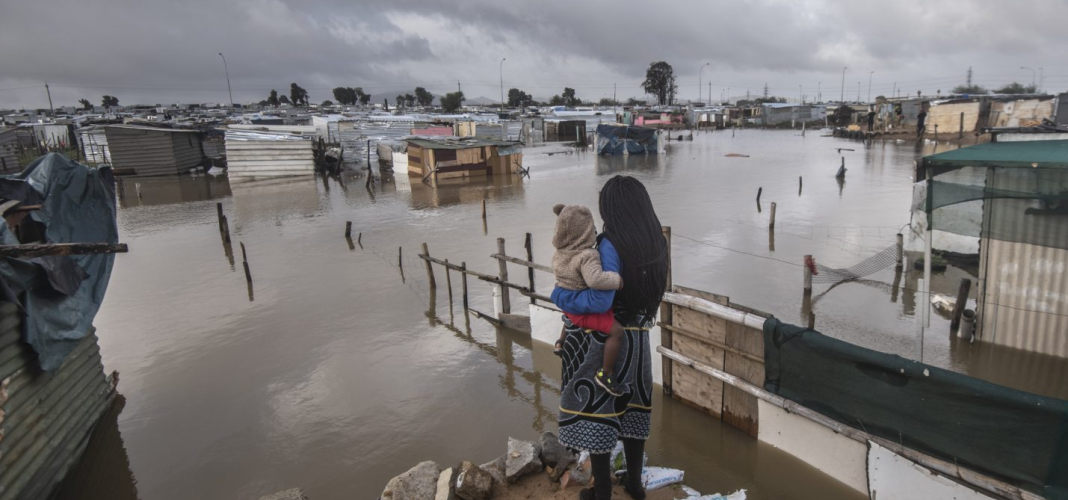By Charmaine Ndlela
South Africa’s government is endangering the well-being and, in many cases, the lives of more than five million people living in informal settlements by failing to provide adequate housing and essential services, Amnesty International South Africa said in a report released this week.
Titled ‘Flooded and Forgotten: Informal Settlements and the Right to Housing in South Africa’, the report investigates how large-scale and seasonal floods driven by heavy rain affect residents of informal settlements and other underserved areas in Johannesburg, eThekwini and Cape Town.
Amnesty said people in these communities, many living on flood-prone land, are routinely left to cope on their own during severe weather despite the state’s legal responsibility to prepare for and respond to disasters.
“Informal settlements in South Africa along with other underserved areas like temporary relocation areas, are a sore reminder of the racial injustice and disenfranchisement that were hallmarks of the colonial and apartheid regimes preceding 1994. However, this does not mean that we must ignore the fact that the ongoing housing crisis and the failure of successive governments to guarantee the right to access to adequate housing among other human rights,” said Amnesty International South Africa Executive Director, Shenilla Mohamed.
“The government is failing the millions of people trapped in these underserved areas, especially in a time when economic hardships and poverty are rife. People live in informal settlements because there is a lack of affordable and accessible formal housing and sometimes because they are the only affordable means of living close to work or work opportunities. Article 10 of South Africa’s Constitution, which is part of the Bill of Rights is clear that everyone has inherent dignity and the right to have their dignity respected and protected, no matter who they are.”
Amnesty said the deadly June 2025 floods in the Eastern Cape, which claimed more than 100 lives and washed away thousands of homes, highlighted the need for urgent, sustained action.
While the Disaster Management Act and the National Disaster Management Framework aim to reduce risk, evidence compiled by Amnesty from interviews, case studies and legal reviews found responses to both major and seasonal flooding are patchy and piecemeal, with insufficient preparation.
The group cited ongoing hardship among people displaced by KwaZulu-Natal’s 2022 floods, many of whom remain in temporary emergency accommodation in poor conditions nearly three years later.
Some who were relocated later died when their new area was severely flooded in 2025, it said, indicating there was failure to ensure relocations were safe.
Support during seasonal flooding was often poor or absent, according to the report’s findings.
Although the KwaZulu-Natal Department of Human Settlements told Amnesty in an October. 30, 2025 response that “informal settlements are not planned settlements and inherently their establishment would not be preceded by the availability of basic services”, the organisation said constitutional and international obligations still require the state to provide essential services to all residents.
“The reality, as documented in Amnesty International’s report, is that millions of South Africans living in informal settlements are deprived of these rights due to central government neglect, under-resourced municipalities, and poor urban governance, not simply because their settlements are unplanned,” Mohamed said.
“The lack of access to adequate, well-located affordable housing in South Africa has also led to the growth of informal settlements in floodplains and low-lying areas which means that people living there are increasingly impacted by flooding.”
Amnesty said climate change, driven by human activity, was worsening flood risks for communities that have contributed least to global emissions and are least able to recover.
Residents interviewed across the three metros reported that regular seasonal floods rarely triggered municipal disaster responses, leaving them dependent on charity. A woman from Freedom Park in Johannesburg said: “We have no help from anyone, we have to stay and fix it, we can’t run away… where will we go?”
Municipal registers indicate the issue spans hundreds of sites across major cities.
In Johannesburg, the city’s 2024/25 human settlements plan recorded 317 informal settlements in total, of which 181 were recognised for specific programmes; a 2025/26 planning update has indicated a rise towards 352.
In eThekwini, according to a human settlements report, there are an estimated 570 to 589 informal settlements.
In Cape Town, the 2024/25 Planning for Informality dataset lists 204 recognised informal settlements comprising 437 mapped “pockets” or clusters.
Counts vary by definition and by year as settlements are re-enumerated, consolidated or newly recognised.
South Africa is a party to major international and regional human rights treaties, including the U.N. International Covenant on Economic, Social and Cultural Rights, which protects rights to adequate housing, water and sanitation.
It also has domestic laws and policies covering housing, essential services, informal settlement upgrading, environmental health, and disaster readiness.
“Despite South Africa having strong legislation and policy and clear international commitments as with so many other things in this country, implementation remains the issue. The reality points to obvious failures of the government to adequately and thoroughly realise these obligations and this comes at a huge cost to the human rights, lives and livelihoods of millions of people,” Mohamed said.
Amnesty called on the government to provide access to adequate housing and to upgrade informal settlements with essential services in line with human rights standards, backed by clear budget and policy commitments.
It said authorities must mobilise the human, financial and technical resources needed to embed disaster risk reduction into urban planning to protect residents of informal settlements from climate-related and other disasters and safeguard their rights.
The report is based on qualitative research carried out between February and September 2025.
INSIDE METROS

